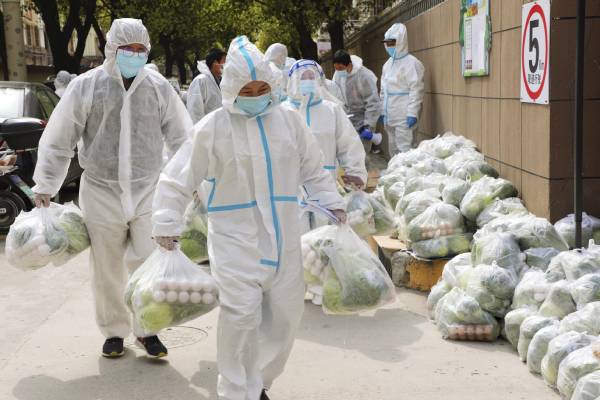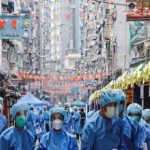Protests against China’s restrictive COVID-19 policies have spread to more cities as anger mounts over a deadly fire in the western Xinjiang region that has been connected to the country’s strict lockdown policies.
Hundreds of students from Beijing’s Tsinghua University rallied at their campus on Sunday, the AFP news agency reported, chanting “freedom will prevail” and calling for an end to lockdowns.
The rally follows demonstrations overnight in Shanghai, China’s most populous city and financial hub, as well as at a university in the eastern city of Nanjing.
A student at Tsinghua told AFP that Sunday’s gathering began at 11:30am (03:30 GMT), when “students started holding up signs at the entrance of the canteen, then more and more people joined”.
The student added: “Now there are 200 to 300 people… We sang the national anthem and the Internationale, and chanted ‘freedom will prevail’”.
There was no immediate comment from the Chinese government.
In Shanghai, hundreds of people gathered at the city’s Wulumqi Road at midnight, The Associated Press reported, bringing flowers, candles and signs reading “Urumqi, November 24, those who died rest in peace” to memorialise 10 people who died in a fire in an apartment building in Xinjiang’s capital city, Urumqi.
The deaths have sparked widespread public anger as many internet users have surmised that the residents of the high-rise building could not escape in time because the building was partially locked down. City officials have dismissed the claim, however.
The crowds in Shanghai chanted, “Lift lockdown for Urumqi, lift lockdown for Xinjiang, lift lockdown for all of China!”, according to a video said to be of the demonstration that circulated on social media.
At one point a large group began shouting, “Down with the Chinese Communist Party, down with Xi Jinping, free Urumqi!”, according to witnesses and video footage.
A large group of police looked on and sometimes tried to break up the crowd.
A protester who gave only his family name, Zhao, told AP that one of his friends was beaten by police and two friends were pepper-sprayed. He said police stomped his feet as he tried to stop them from taking his friend away. He lost his shoes in the process, and left the protest barefoot.
Zhao said the protesters yelled slogans, including “Xi Jinping, step down; Communist Party, step down”, “Unlock Xinjiang, unlock China”, “do not want PCR [tests], want freedom” and “press freedom”.
Another protester, who also gave only his family name, Xu, told the AP there was a larger crowd of thousands of demonstrators.
Posts about the protest were deleted immediately on social media, as China’s Communist Party commonly does to suppress criticism.
Some social media users posted screenshots of street signs for Wulumuqi Road, both to evade censors and show support for protesters in Shanghai. Others shared comments or posts calling for all of “you brave young people” to be careful. Many included advice on what to do if the police came or started arresting people during a protest or vigil.
The explosion of criticism marks a sharp turn in public opinion. Early on in the pandemic, China’s approach to controlling COVID-19 was hailed by its citizens as it minimised deaths at a time when other countries were suffering devastating waves of infections.
But support for Xi’s signature policy of “zero-COVID” has dissipated in recent months, as Beijing continues to adhere to the restrictions even as much of the world tries to coexist with the coronavirus.
While low by global standards, China’s cases have hit record highs for days, with nearly 40,000 new infections reported on Sunday for the previous day.
In Xinjiang, where the government has been accused of abuses against the mainly Muslim Uighur minority, residents have been locked down since August. Most have not been allowed to leave their homes, and some have reported dire conditions, including interrupted food deliveries that have caused residents to go hungry.
One woman told AP that some residents have had their doors chained. The agency said many in Urumqi believe such brute-force tactics may have prevented residents from escaping in Thursday’s fire.
Their anger boiled over after Urumqi city officials held a news conference about the fire in which they appeared to shift responsibility for the deaths onto the apartment tower’s residents.
“Some residents’ ability to rescue themselves was too weak,” said Li Wensheng, head of Urumqi’s fire department.
Police also clamped down on dissenting voices, announcing the arrest of a 24-year-old woman for spreading “untrue information” about the death toll online.
Late on Friday, people in Urumqi marched largely peacefully in the cold winter night.
Videos of protests featured people holding the Chinese flag and shouting “Open up, open up”.
Images spread rapidly on Chinese social media despite heavy censorship. In some scenes, people shouted and pushed against rows of men in the white whole-body hazmat suits that local government workers and pandemic-prevention volunteers wear, according to the videos.
By Saturday, most of the images had been deleted by censors, but authorities in Urumqi on the same day opened up some neighbourhoods in the city of four million people that were deemed low risk.
In Beijing, some residents under lockdown staged small protests or confronted local officials over movement restrictions, with some successfully pressuring them into lifting the curbs before a schedule.














